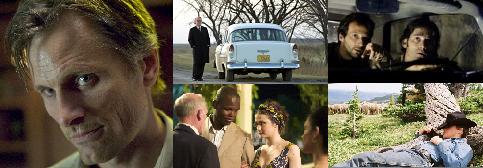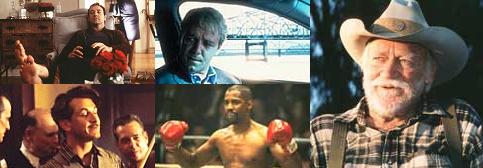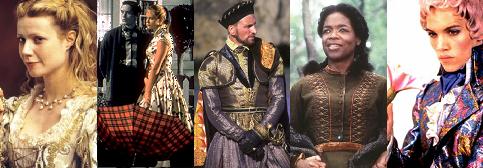13 Ways of Feeling Better about Oscar

I remember Oscar last year, and so do you, and we all know that after the telecast ends tomorrow night, all of us who have obsessed over these awards for weeks will suddenly have that unsatisfied thud in the stomach that comes from realizing, yet again, that Oscar perennially honors the wrong movies, or applies the wrong criteria, or reveals the wrong biases, or rewards the wrong actors at the wrong times or in the wrong categories. To say nothing of how the whole structure and spectacle of the Oscars is commodifying, wasteful, and competitive, premised on a xenophobic privileging of American movies over "foreign" ones and a corporate endorsement of big- and middle-budget movies over truly independent ones. The minute you even think about poking a hole in the mystique of the Oscars, the opportunities are endless.
But we love them anyway. And lest we convince ourselves that the voters never get it right, and that the Oscars serve no valuable purpose, here are 13 examples of categories from the last 13 years where the Academy found five terrific nominees to fill an entire field—drawing our attention to fine work in diverse styles. If all that Oscar does is sustain a collective memory of artistry at this level, catching our eye and stoking our attention, then it can't be all bad, right?

2005 Best Adapted Screenplay My favorite nominee was Dan Futterman's emotionally guarded, psychologically incisive portrait of Capote while he traded his soul for the literary masterpiece of In Cold Blood. But the blending of psychological tension, historical recreation, and the legacy of violence was nearly as bracing in the script for Munich; Josh Olson took great structural risks in the stripped-down parable A History of Violence; Jeffrey Caine's shrewd, uneasy script was the strongest formal element of The Constant Gardener; and the winning script for Brokeback Mountain, whatever its structural blind-spots, tells a surprising story by Hollywood standards and whittles a tough, terse bond between two people down to a strong, affecting shape. Extra points to Oscar for noticing Amy Adams' melancholy pluck in Junebug, Emmanuel Lubezki's ingenious manipulations of natural light in The New World, and Dolly Parton's brilliant lyrics, melodious gusto, and gentle topical message in the song "Travelin' Thru."
2004 Best Actress Probably the least of these performances, Hilary Swank's dogged, resilient boxer, ultimately humiliated by life in Million Dollar Baby, evokes a deceptively simple character through voice, movement, and a careful modulation between openness and reserve. Annette Bening thrives on flamboyant, theatrical openness through much of Being Julia but suggests in the closing sequences that this woman has still more unexplored depths. Those are two remarkable nominees, but even they are outshone by the smart, unsanctimonious martyrdom of Catalina Sandino Moreno in Maria Full of Grace; the heroic, tragic blend of virtue, affection, and naïveté in Imelda Staunton's Vera Drake; and Kate Winslet's career-capping transport of her vivacity, economy, and forceful energy to the confused, electric, unhappy, and comical Clementine Kruczynski in Eternal Sunshine of the Spotless Mind. Extra points to the Music Branch for looking past the many idiocies of The Village and giving due credit to James Newton Howard's powerful score.

2003 Best Actor Jude Law was less generally celebrated than his fellow nominees during the 2003 awards season, but if anything his performance is the most heroic: resolutely quiet and full of subtle, internal, estranging gestures in a film that is otherwise intent on huge gestures, big acting, and pretending that the past is just like the present, only earlier. He's terrific, as are the sad, sarcastic, but uncynical Bill Murray in Lost in Translation, the tightly coiled Sean Penn, eaten alive with grief and turning his fury outward on thin pretexts; Ben Kingsley, continuing his world tour of accents and nationalities but still supplying the ramrod center that House of Sand and Fog desperately needs; and Johnny Depp, earning one of those Oscar nods that must have seemed impossible while the movie was in production, if only because of typical genre snobberies. Depp convinced the Academy, and all the rest of us, that smart, creative acting can emerge exactly where no one is looking for it. Extra points to the exemplary, historically attuned, and rhetorically controlled documentary The Weather Underground and to all those technical nods to the commercially underperforming Master and Commander: The Far Side of the World, which needed and deserved the fairer shake that 10 nominations afforded it.
2002 Best Original Score John Williams tends to get nominated no matter how daring or conventional the score, but his work on Catch Me If You Can found him in a brand-new mode as a modern Henry Mancini, with sly undertones appropriate to the film. Thomas Newman is also a perennial nominee, and in truth I'm not absolutely crazy about his score for Road to Perdition, but the category still places well above average with the florid melodies and exciting rhythms of Frida, the barreling, restless, melancholy rolls of Philip Glass' threnodies for The Hours, and Elmer Bernstein's peerless excavation of the bleeding, vulnerable heart inside the kitsch and occasional bombast of 1950s orchestration in Far from Heaven. Extra points for keeping the musical nominees and winners well above average with Eminem's anthemic "Lose Yourself," for including Pedro Almodóvar in the Best Director field for Talk to Her, and for the Original Screenplay nod to Y tu mamá también.

2001 Best Cinematography Director and co-writer Jean-Pierre Jeunet keeps falling in love with the heroine of Amélie, but cinematographer Bruno Delbonnel never stops reminding us that the ardor and whimsy of Amélie is also myopic, unreal, and mad. Which can be a good thing. Even more audacious feats of world-making bloom in every sequence of Moulin Rouge and The Lord of the Rings: The Fellowship of the Ring, with their impossibly rich colors, endless vistas, and delirious movements. Roger Deakins' gleaming, pearly black & white for The Man Who Wasn't There is equally mannered but pulls out the emotional thread of the movie, right there amidst all the artifice. Black Hawk Down won Oscars for its editing and its soundtrack, but Slawomir Idziak, one of the hundreds of genius cinematographers they apparently mass-produce in Eastern Europe, gets his camera into improbable places and frames some galvanizing sights, without calling too much attention to itself. Extra points to the Best Director nomination for David Lynch and for another of John Williams' Best Original Score nods, this time for the schizophrenias and bold tones of A.I. Artificial Intelligence.
2000 Best Film Editing Again, I'm cheating a little to work around Almost Famous, which lacks Jerry Maguire's athletic ease at moving back and forth amongst comedy, pathos, introspection, and other emotional registers, although the performance sequences work splendidly and arrive just when the film needs them. From there on out, no quibbling is required. Well, a teeny bit. There's way too much Gladiator to go around, and so much of it is so deeply silly, but the editing shares the strength and flair of the acting. Crouching Tiger, Hidden Dragon manages to speed and slow its rhythms without pulling the dialogue scenes too far away from the action, and sequences like the surprise attack by Jade Fox are as good as action sequences get. The threading of the storylines in Traffic allows for an overall resonance and intuitive power of connection that's been missing from most of the recent multi-narrative human panoramas. Best in show, though, is Dede Allen's typically adroit cutting of Wonder Boys, a well-written, well-shot, and well-played dramedy that still wouldn't pop off the screen the way it does if Allen weren't so shrewd at picking out what we should be looking at, in what moments, in what sequence, and for how long. She's as deft and talented a novelist as Michael Douglas' protagonist, and infinitely more disciplined. Extra points for breaking from the songwriters' usual prejudices and taking a chance on Björk's sad, gorgeous dirge "I've Seen It All" from Dancer in the Dark; for giving due credit to the makeup in The Cell even though the art directors, sound designers, and everyone else ignored it; and for refusing to siphon the Soderbergh vote and giving a Best Director nod for Erin Brockovich, even though it's exactly the sort of woman-centered Best Picture nominee that the directors usually reject, and especially with another, more formally precocious film by the same director already in competition.

1999 Best Actor A field so strong that the Academy spent the next four years making up the necessary losses to Russell Crowe, Denzel Washington, and Sean Penn. Winner Kevin Spacey sold his own fey, charming wiseacre persona more than he dug into the complexities of the character, though his is a beguiling and resourceful personality performance. Still, the wise, elegant simplicity of Richard Farnsworth in The Straight Story amply shows him up. Extra points for the Collette-Keener-Sevigny trifecta in Best Supporting Actress, the imaginative but perfectly targeted Sound Effects Editing nomination for Fight Club, a way-better-than-average Best Original Song lineup (with the crowning glory of Toy Story 2's heartbreaking "When She Loved Me"), and the delicious, unexpected generosity toward Mike Leigh's Topsy-Turvy, winning two Oscars in four categories.

1998 Best Costume Design Sandy Powell's double-act of the sparkling Velvet Goldmine and the resplendent Shakespeare in Love is a feat most costume designers don't hit in a decade of trying. Alexandra Byrne's duds in Elizabeth keep delicious track of the lead character and cover up so well for the low-budget sets that they, too, scored a nomination. Judianna Makovsky puts some modern wit into Pleasantville without spoiling the fun. And even Toni Morrison, who had a hard time loving Jonathan Demme's adaptation of her masterpiece Beloved, was impressed and enchanted with the sartorial detail, the period fabrics, and the evocative colors of Colleen Atwood's clothes, the second of her six nominations, and the most richly deserved. Extra points for sneaking Edward Norton of American History X into the Best Actor lineup after his shameful neglect by all of the precursors, and the recognition to Anne V. Coates' sublime editing of Out of Sight.

1997 Best Adapted Screenplay One of the healthiest rosters this race has ever seen, ranging from the poignantly evoked characters and tightly wrought suspense of two otherwise disparate crime pictures, Donnie Brasco and L.A. Confidential; the angry and absorbing communal grief in The Sweet Hereafter, which keeps yielding new facets as the complicated structure unfolds; the rat-a-tat dialogue and escalating looniness of Wag the Dog, whether Hilary Henkin had any real hand in it or not; and the expert distillation of Henry James' masterpiece The Wings of the Dove into the quiet conspiracies and delicate emotional tableaus of Iain Softley's film. Extra points for the surprise acknowledgment of Robert Forster in Best Supporting Actor for Jackie Brown, the just desserts for the thrilling set-pieces in the Sound Design for Contact, and the persuasive, unpretentious costumes of the eleventh-hour December release Oscar and Lucinda.

1996 Best Actress Still the high-water mark in the last 30 years of this category. Diane Keaton in Marvin's Room is the weak link, for the sole reason that she's only very, very good. Not a new industry standard in sexing up aristocratic chilliness, stitching self-absorption to erotic, intelligent connection, like Kristin Scott Thomas in The English Patient; not a one-woman tragicomic opera of oscillating, overflowing emotion like Brenda Blethyn in Secrets & Lies, dialing back to share in the ensemble without dulling her character's histrionic propensities; not an uncanny fusion of the ethereal and the embodied like Emily Watson in Breaking the Waves, still the only actress who's felt totally in synch at every moment with Lars von Trier's extravagant demands and rhetorical brio; and not a wizard at conveying straightforwardness and decency through farcical affectation like Frances McDormand in Fargo, possibly the un-glammest winner in Oscar history, and one of the most deserving. Extra points for a Best Supporting Actress field that would be every bit as stunning as the lead race if it weren't for Lauren Bacall, the Original Screenplay nod to John Sayles' Lone Star, the subtle, unsettlingly entomological costumes of Angels & Insects, and the once-in-a-lifetime divvying of Best Sound and Best Sound Effects noms to totally different films.

1995 Best Supporting Actress I would have stumped for what looks like a terrific and impressively varied Art Direction lineup (including the sterling Apollo 13, Babe, and Richard III, and avoiding easy gimmes like Sense and Sensibility or The American President), but I haven't seen fellow nominees A Little Princess or the winning Restoration. So I'm back up in the acting races, grooving on Joan Allen's steel and fire as Pat Nixon, Kathleen Quinlan's inexplicable gift for turning her patient-Penelope role into something memorable, Mira Sorvino's limited but engaging schtick as the vacuous porn vixen in Mighty Aphrodite, Kate Winslet's emotional candor and impetuous energy in Sense and Sensibility, punching up Ang Lee's restrained direction while also complementing it, and my personal favorite, Mare Winningham's slow burn, gorgeous singing, and bourgeois isolationism in Georgia. Extra points for acknowledging Richard Francis-Bruce's harsh, exciting montage in Se7en and Bruce Springsteen's haunting title song from Dead Man Walking.
1994 Best Original Screenplay A category brimming with scripts so good that people are still talking about them, and imitating them. Every time a new Woody Allen movie opens, we collectively remember that he hasn't been truly spot-on funny since Bullets Over Broadway. The British film industry spent years trying to duplicate the comic zing and exportable charms of the star-making Four Weddings and a Funeral. Heavenly Creatures has managed the estimable feat of not being overshadowed by Peter Jackson's stupendous success with The Lord of the Rings, while Three Colors: Red, at the opposite end of a famous career, was the kind of worthy capstone that any filmmaker would envy. And does any argument need to be made for Pulp Fiction, a truly era-defining script? Extra points for laureling the spectacular Makeup, campy but character-specific, of Ed Wood, and the comically poignant Live Action Short Film Trevor, about a gay pre-teen. (Buy it now on iTunes!) And Milcho Manchevski's Before the Rain, from Macedonia, is more formally challenging and subtly poetic than almost any of the usual nominees in this category. Maybe one day it will actually appear on DVD.

1993 Best Picture A jewel among Oscar years. Easily the sturdiest Best Picture lineup since the 1970s, still unmatched in any subsequent year. They filled the usual "slots" for this category and still excelled expectations (unlike, say, the 1996 lineup, which scored high by torquing the usual balance between studio product and critical darlings). If only every People's Choice contender were as exciting, character-rich, and technically proficient as The Fugitive. If only every late-December buzz entry were as galvanizing and unabashedly political as In the Name of the Father. If only the compulsory British period-film were as emotionally lucid and impeccably acted and gorgeously scored as The Remains of the Day. If only the obvious, inevitable front-runner were legitimately an instant classic like Schindler's List, and if only the best movie ever competed for Oscars every year. This embarrassment of riches trickled down to all the other categories, with each movie earning at least seven nods, but more greatness was on the way: Angela Bassett, Stockard Channing, Leonardo DiCaprio, Laurence Fishburne, and John Malkovich in the acting categories, Robert Altman in the Director lineup for Short Cuts, The Age of Innocence and Orlando lighting up the design categories, Jurassic Park an estimable champion in the Sound and Visual Effects races. The Neil Young nomination for Best Song took some guts, as did the underrated Janet Jackson ballad "Again" from Poetic Justice. And in Cinematography, beyond the Two Towers of The Piano and Schindler's List, plus a third spot for the less obvious but wholly deserving Fugitive, the Branch had the creativity and good sense to spring for the rapturous historical epic Farewell My Concubine and the astutely framed, sensitively shot Searching for Bobby Fischer. Anyone watching the 1993 Oscars with an eye toward learning any of the constituent arts of filmmaking—directing, lensing, editing, acting, writing, design, composing, or special effects—was served a splendid buffet of exemplars and role models. Anyone voting for the Oscars could take confidence that none of the winners would embarrass anybody. Anyone nominated could feel like they deserved it.
Labels: Oscars


 This blog supports
This blog supports 





3 Comments:
what a great article
i wish i had something to say other than "gush gush" but this is beautiful. the pick me up we all need.
Ditto to what Nathaniel said; you're the coolest. It's very difficult to quibble with categories as good as these, and thanks especially for reminding me about the 1998 Costume Design picks.
Fun piece. Every year there's a category or two that feels just about right. It's a welcome change, I think, to have a hard time choosing a favorite in a category because it's so full of riches, rather than because it's so mediocre.
Another great thing about the 2000 Oscars was that their nomination of Don Hertzfeldt's REJECTED in the animated short category. Didn't stand a chance for the win, but it's such an un-Oscar-y short that it's nice to see it recognized by them at all.
Post a Comment
<< Home